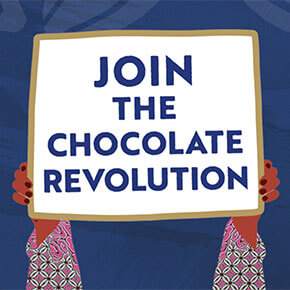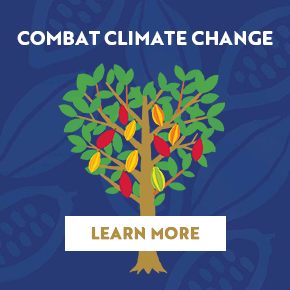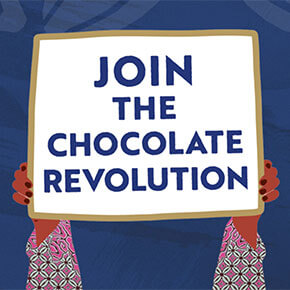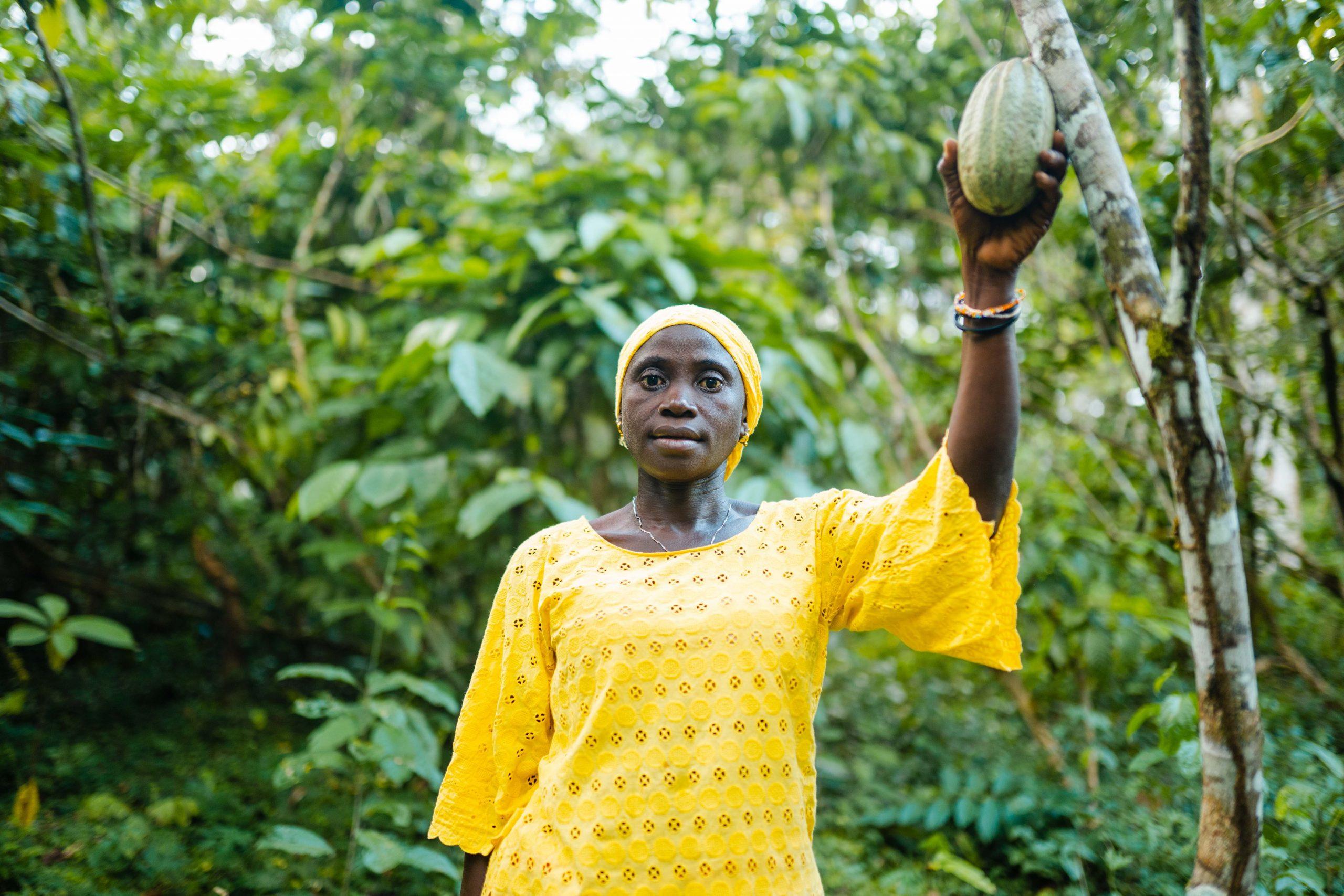Co-ownership: A Unique Business Model
The cocoa industry is worth over US$ 100 billion dollars a year, yet an average cocoa farmer earns less than a $1 a day. This means on average, cocoa farmers earn just 6% of the final value of a bar of chocolate. In contrast, the Divine business model reflects the belief that producers should earn an equitable share of the profits they help to create, and have a say in their future. Divine’s mission is to help build a world where farmers thrive and prosper, and are no longer exploited by the cocoa industry for our chocolate pleasure.
A More Equitable Share of Wealth
Divine Chocolate is the only Fairtrade chocolate company that is also co-owned by cocoa farmers. Kuapa Kokoo, a co-operative of over 100,000 cocoa farmers in Ghana who grow the finest quality cocoa for Divine products own a 20% stake in Divine. We look to redistribute wealth to Kuapo Kokoo cocoa farmers through four streams of income:
-
- Fairtrade prices for all the cocoa we source for our chocolate products
- The Fairtrade Premium to invest in economic, social and environmental initiatives for the benefit of farmers, their families and wider communities
- Farmer-led Producer Support and Development programmes to increase resilience and secure sustainable livelihoods
- A share of distributable profits
A Diverse and Inclusive Business
The Divine co-ownership business model means that Kuapa Kokoo has 40% Board representation. The Co-operative is involved in both strategic decisions, as well as day to day initiatives such as marketing campaigns and storytelling. Producer Support and Development programmes are also designed in consultation with farmers to ensure they represent community needs. Maximising farmer voice throughout various aspects of Divine’s business promotes a move towards a more equitable and inclusive chocolate industry, one that supports and promotes the interests of farmers. Multi-stakeholder and diverse business models, such as these equip us all with finding appropriate solutions to tackle socio-economic issues on a global scale.
Christiana Ohene-Agyare. Recorder of the Kwabeng Kuapa Kokoo Society and National Treasurer of the Credit Union says, “In Ghana, farmers are normally not consulted before decisions affecting us are taken. They just assume that farmers would like one thing or the other. Most of the time policy makers get it wrong! Kuapa Kokoo however, offers farmers an opportunity to decide for ourselves. I am very proud to be a member of a cooperative that co-owns Divine Chocolate. Two members from Kuapa sit on their board. It is unique! I do not know any other organisation in the world that has this kind of business relationship. People all over the world know Kuapa Kokoo because we co-own Divine and we are very proud of our chocolate company. I wish to entreat more people to buy Divine!”
The Beginnings of Kuapo Kokoo and Divine
In 1993, a group of cocoa farmers including a visionary farmer representative on the Ghana Cocoa Board, Nana Frimpong Abrebrese, came together to form a co-operative that would collect and sell its own cocoa, and establish a business run by farmers for benefit of farmers. Kuapa Kokoo, meaning “Good Cocoa Farmer” was built upon Fairtrade standards and running the co-operative as a professional, efficient business. Kuapa Kokoo quickly developed a reputation for producing high quality cocoa as exemplified by its motto "Pa Pa Paa" meaning "the best of the best." Key objectives for the co-operative included increased market power and representation for farmers, socio-economic and political empowerment, enhanced women's participation, and environmentally sustainable production processes.
In 1997, Kuapa Kokoo farmers (represented by one man and one woman from every village) voted to set up their own chocolate company and brand. This was so they could secure their share of the growing and profitable chocolate market as well as increase their knowledge of the chocolate market. The Day (now Divine) Chocolate Company was born in the following year.
A thriving business built upon on Co-operative and Co-ownership principles
Kuapa prides itself on its democratic approach, and all decisions affecting farmers are taken by elected representatives. Farmers decide collectively how to invest the Fairtrade Premium, with priority given to providing clean water, education, healthcare, sanitation and individual bonuses.
Kuapa has worked hard to ensure women are empowered, and that children receive a good education. Kuapa has also enhanced participation of women in decision making throughout the organisation by ensuring a minimum number are members of various councils and committees. Over time, women have gained more influence and contributed more to the organisation. Aside from training on a wide range of topics, Kuapa has also supported activities to supplement women’s incomes, making them less dependent on men, and providing money during the off-season. A Credit Union also provides loans to farmer members at competitive rates, along with information and advice on savings and careful spending. The proof of these benefits can be seen in the growth of the number of Kuapa Kokoo societies across Ghana.
Association and cooperation among farmers have helped to share learning, resources, and income, as well as give more leverage to farmers in negotiations. Training farmers about cocoa quality, Fairtrade standards, and health and safety, as well as an outreach team that disseminates latest techniques about good farming have helped to transform a widely dispersed co-operative into a thriving business. Importantly, regular meetings at village, district, regional and national levels, and the Annual General Meeting have ensured farmer views are heard, and co-operative principles adhered to. Kuapa aims for both men and women to be equally able to lead future improvements, and have a platform to ensure their voices are heard.
Through owning Divine, Kuapa Kokoo farmers have benefitted directly from the real value of their crop once made into chocolate as returns are invested in their farms and communities. As well as sharing in the profits, farmers have a say in decisions about how chocolate is produced and sold which increases their knowledge of the competitive global market for chocolate.
Cecilia Appianim of Kuapa Kokoo says, “Ownership of Divine Chocolate has enabled me to meet highly placed people I never imagined I would meet. Divine has indeed given us recognition in the chocolate world.”.
Mr Buah, National President of Kuapa Kokoo says,
“Divine is ours, we own shares and this means that we get a part of their profits. For instance … we used part of the dividend Divine paid us to purchase over 45,000 cutlasses (machetes) for our members. All of us want Divine to be profitable because it is our business, and through it we not only get money – but we come to understand more about the industry we supply, and how to have a stronger voice in it. We own our own little share of the huge and valuable chocolate market!”
Divine continues to lead – championing the changes needed in the cocoa industry, collaborating to find solutions to farmer challenges, and galvanising support from consumers where the chocolate is sold. Over two decades of working with cocoa farmers in Ghana and elsewhere in Africa, we have formed close and rewarding relationships, understood profoundly the challenges farmers face, and developed a unique business model built upon co-ownership and co-operative principles which gives farmers the agency and skills to forge their own sustainable future.






